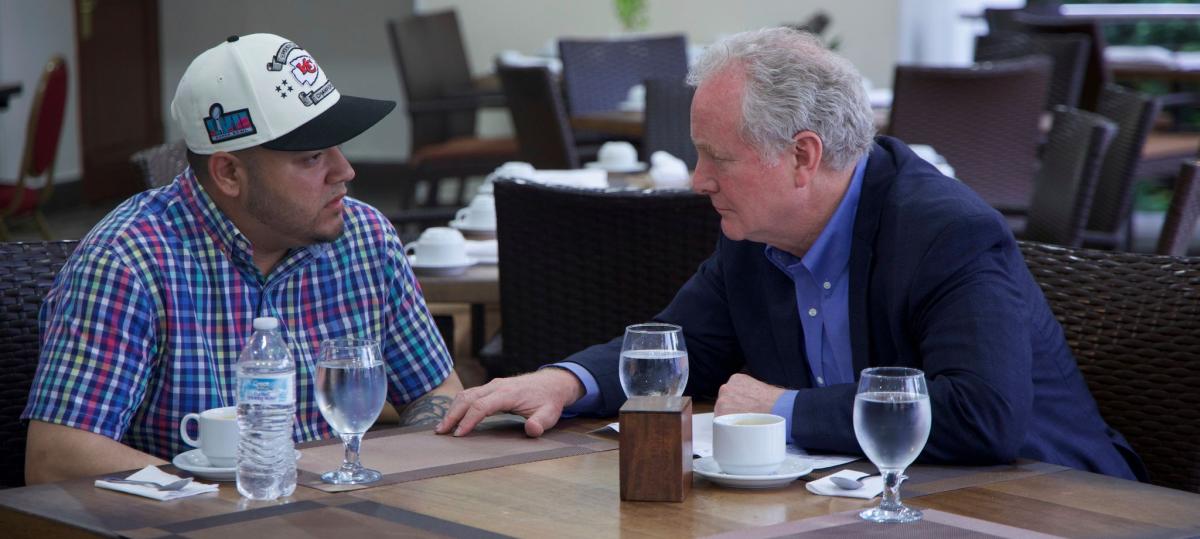This is how Pfister and Knight differed

This is how the candidates beat the officers: one of the two wants significantly more money for the army
The timing could not have been more suitable: Markus Ritter and Martin Pfister asked themselves the questions of the military societies under the impression of the scandal in the White House. There was no election recommendation afterwards.
They already faced Hearings in the middle and boys in the middle: On Monday, the military umbrella organized some differences between Markus Ritter and Martin Pfister.
The hot phase of the election campaign begins with the start of the spring session, because in nine days the Federal Assembly will choose the successor of Federal Councilor Viola Amherd. On Monday afternoon, Martin Pfister and Markus Ritter first answered questions to the farmers' representatives in parliament.
Then it went from the Bundeshaus straight to the team barracks in Bern. Each candidate received 40 minutes each in order to demonstrate what kind of defense minister he would be before the strict eyes of the members of the Swiss officers' Society, Allianz Security Switzerland and the Swiss shooting sports association.
It was the first time that the Federal Council candidate had to face a hearing through the officers. In view of the current world situation, the Department of Defense (VBS) has become a key deputy again, said Stefan Stickenstein, President of the Association of Military Companies. It is therefore very closely to be made to see who will take over the chief position. Ritter already noticed this among the representatives of agriculture, where « 80 percent of the questions about security issues » had made.
The officers cannot decide
However, there was no election recommendation. Holenstein reported an intensive debate. « We were extremely difficult and wanted to make a recommendation, » he said. Both are « valable candidates ».
«Markus Ritter has the‹ Feu Sacré›. He has leadership, that came across very well, »said Holenstein. However, there were some inaccuracies in the terms and he was not with all dossiers à jour. Holenstein pointed out a small mistake: Knight didn't know what “dissuasion” means. It is a term from the Cold War that affects the deterrent.
«Martin Pfister has remained more reserved and a little more non -binding. But he was in the dossiers, »summarized Holenstein.
So they want to bring the army up to scratch
The hearing was public. Pfister and Knight drew very similar pictures of Swiss defense ability. Ritter quoted the retiring army chief Thomas Süssli and said: « Our military would not be able to defend. » Both are for a faster increase in personnel and financial means. Both also referred to the political will. The outgoing Federal Councilor Viola Amherd had unsuccessfully called for a special fund of Tenic CHF for the army. The parliament has not yet shown how this should be financed.
However, the parliament agreed that the federal expenditure for the army should be raised to one percent of Swiss gross domestic product (GDP) by 2032. Holenstein asked whether this was enough, also given the fact that neighboring countries are aiming for two percent of their BIP.
Ritter did not accept this comparison: «Switzerland has almost twice as high per capita income as Germany. It is therefore the same if we spend one percent of it for the army and Germany two. » Martin Pfister, on the other hand, said two percent « would probably need it ».
Different views of the income
The proposal of the Middle Councilor Benedikt Würth that the necessary additional income could be generated by a higher VAT also promoted differences. This is out of the question for Ritter, because: « The army supplies must be able to be financed with the ongoing budget. » Pfister, on the other hand, described this proposal as « very constructive », since the savings package decided by the Federal Council would probably not be sufficient. Pfister mentioned that the Federal Council faced Würth's proposal, « but the last word has not yet been spoken ».
Pfister rejects the service Citoyen initiative, according to which every Swiss citizen has to serve in a militia area such as the army or community service. Ritter remained a little more non -binding in this regard and generally wanted more advantages for women and men in later professional life if they did military service.
Basically, both agreed: military service must get more prestige and attract staff with attractive models. Military members should receive recognition in public. Ritter said: «Everyone should see that the decent, clean people are. That was still the case when I was in the military. »







